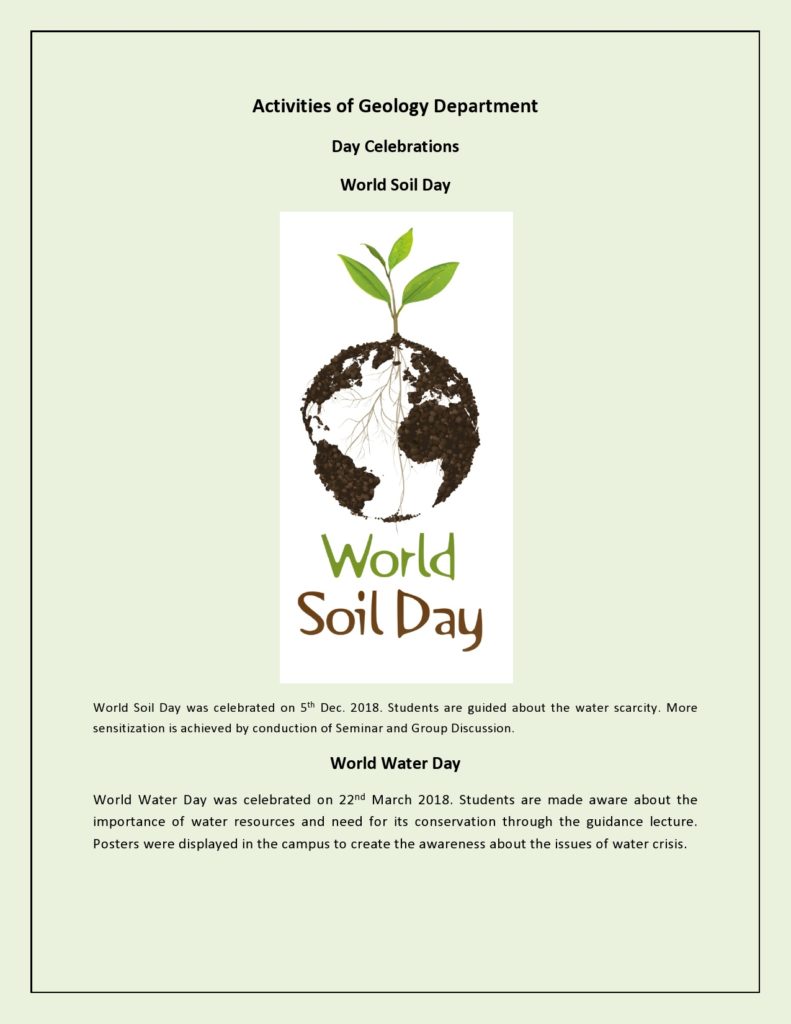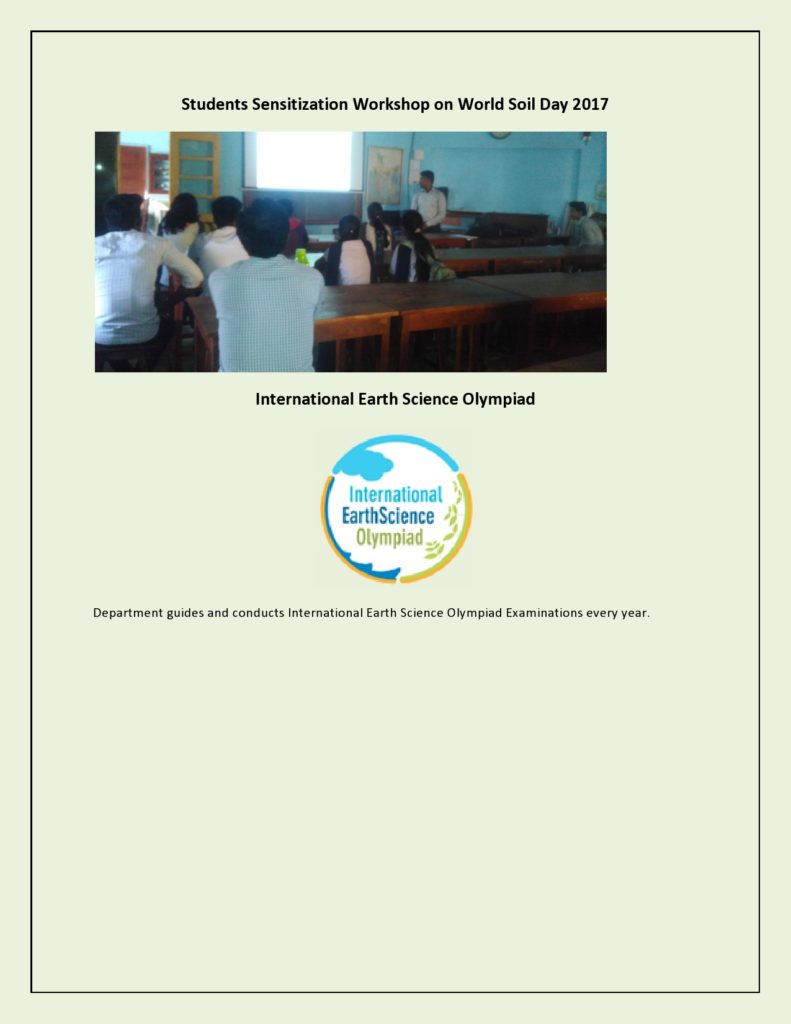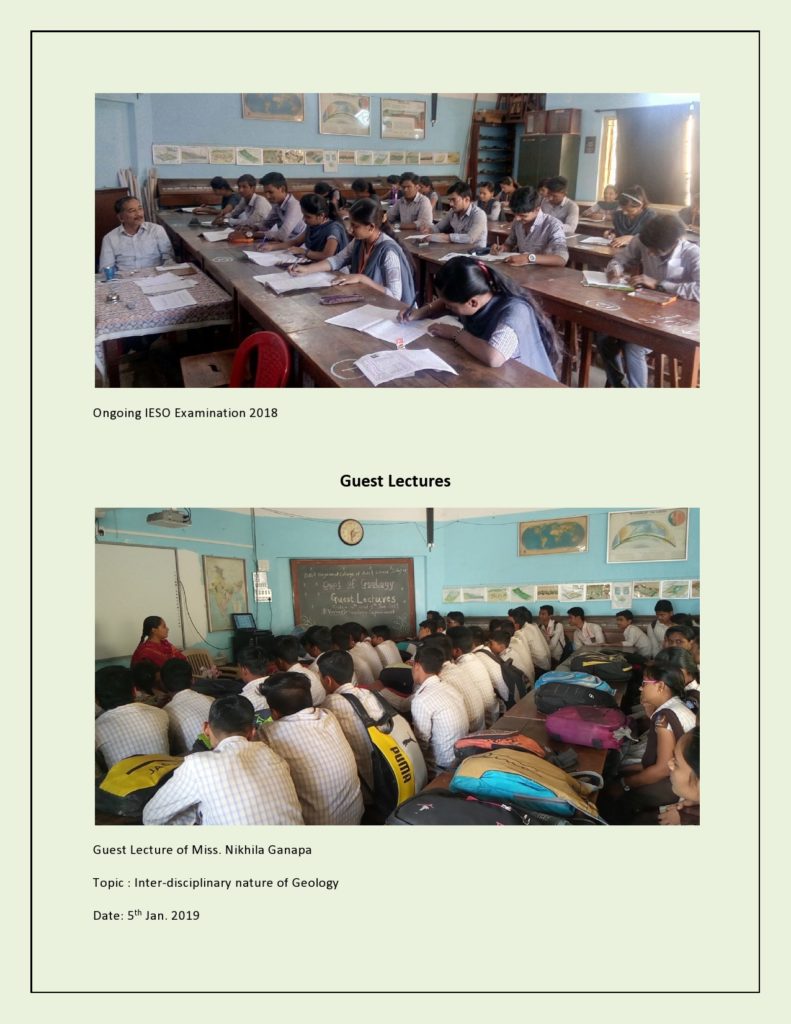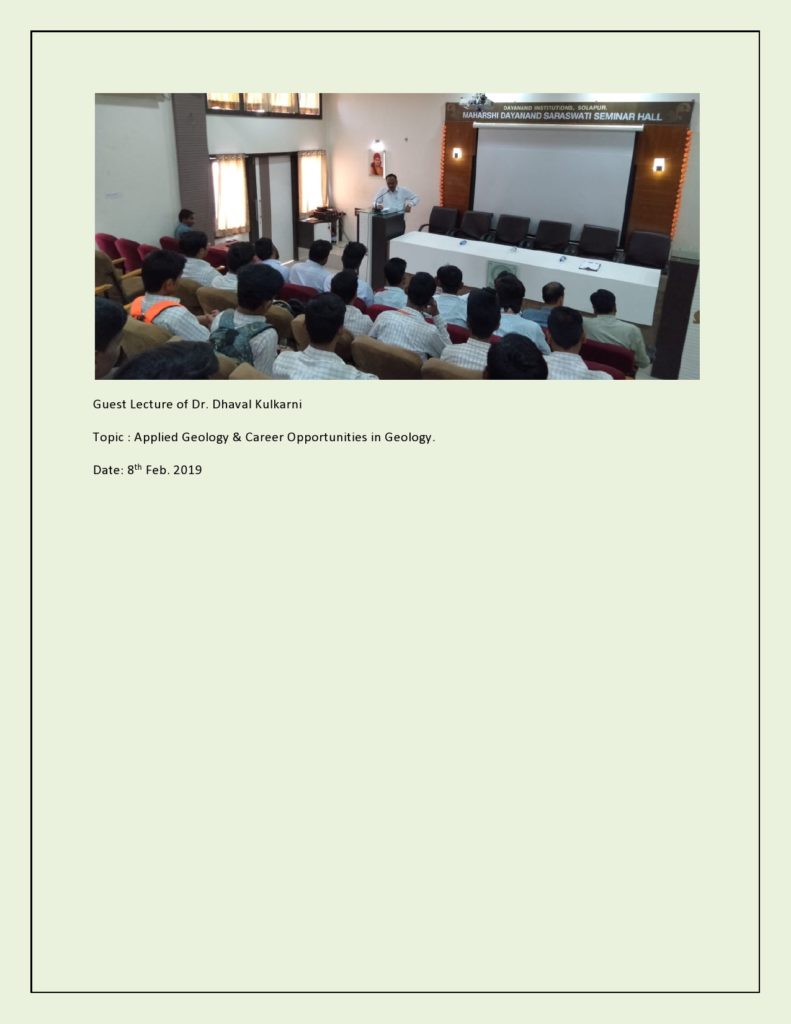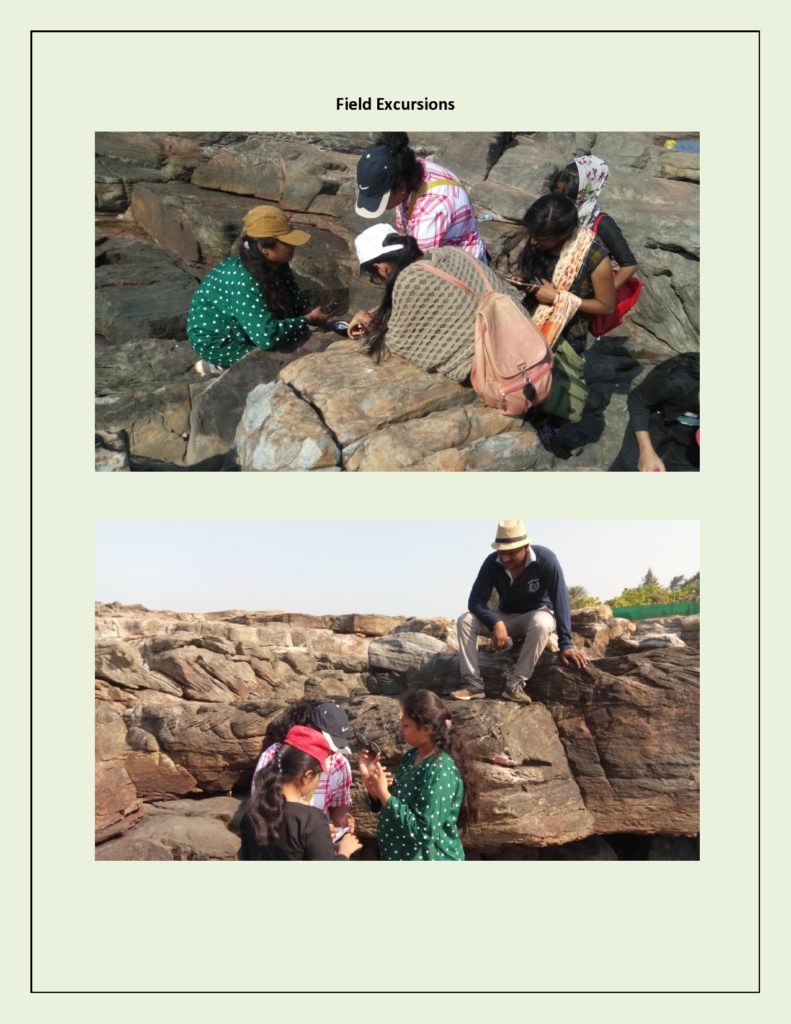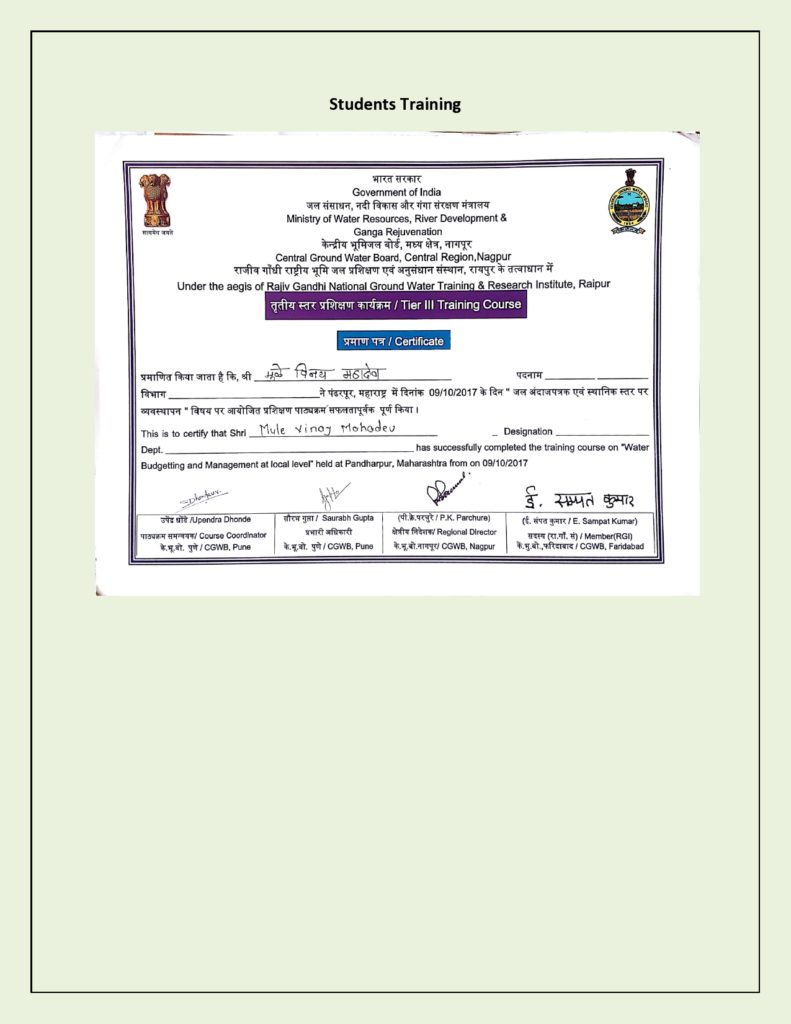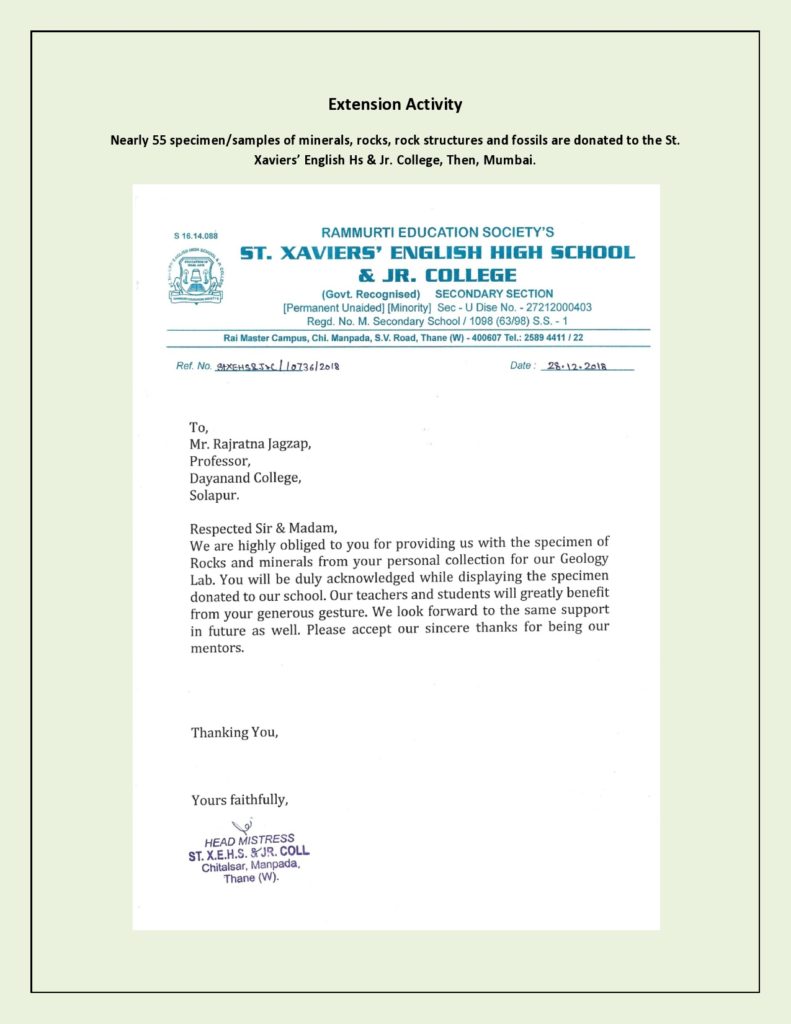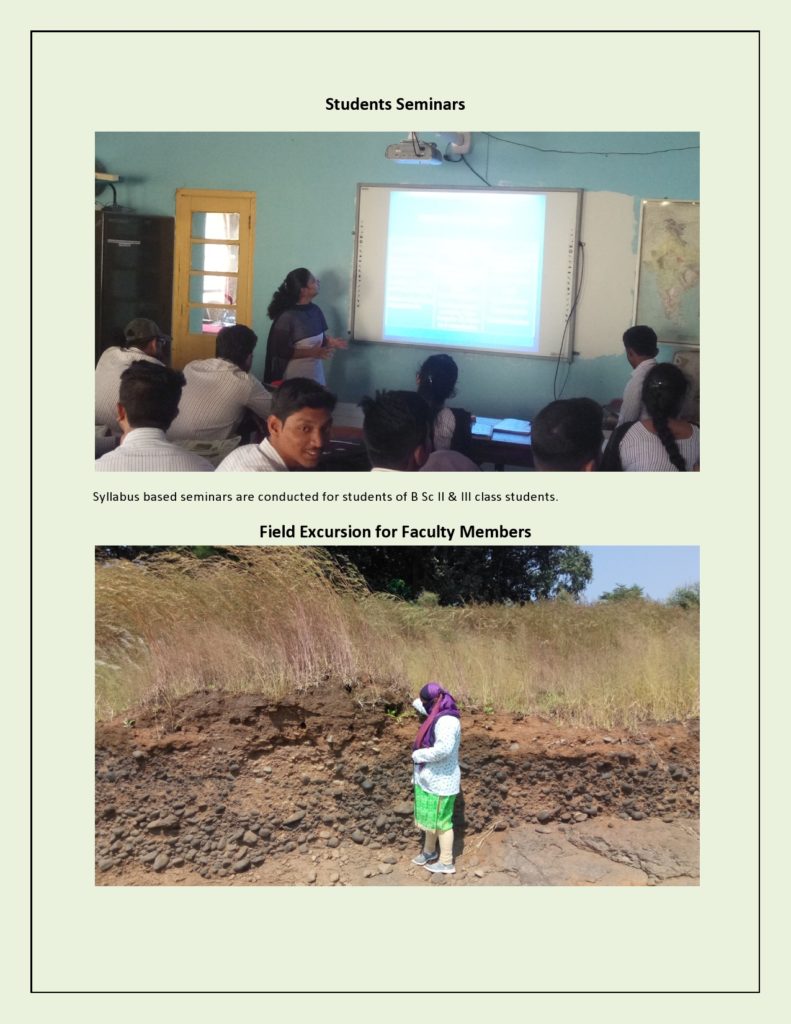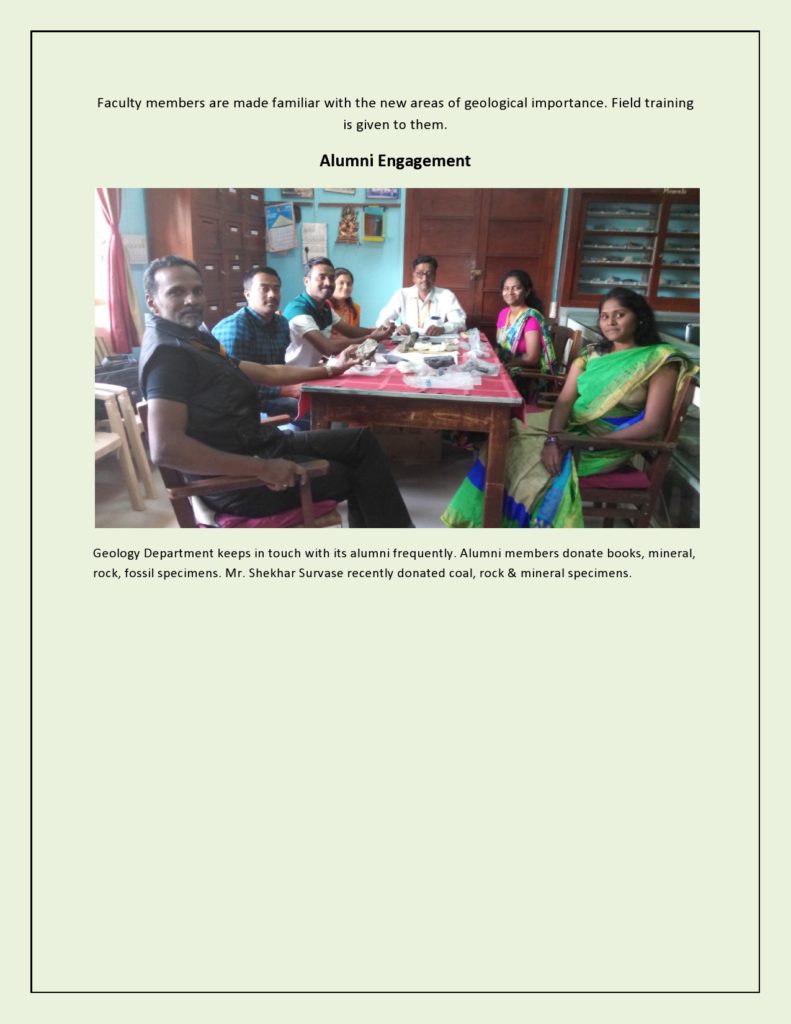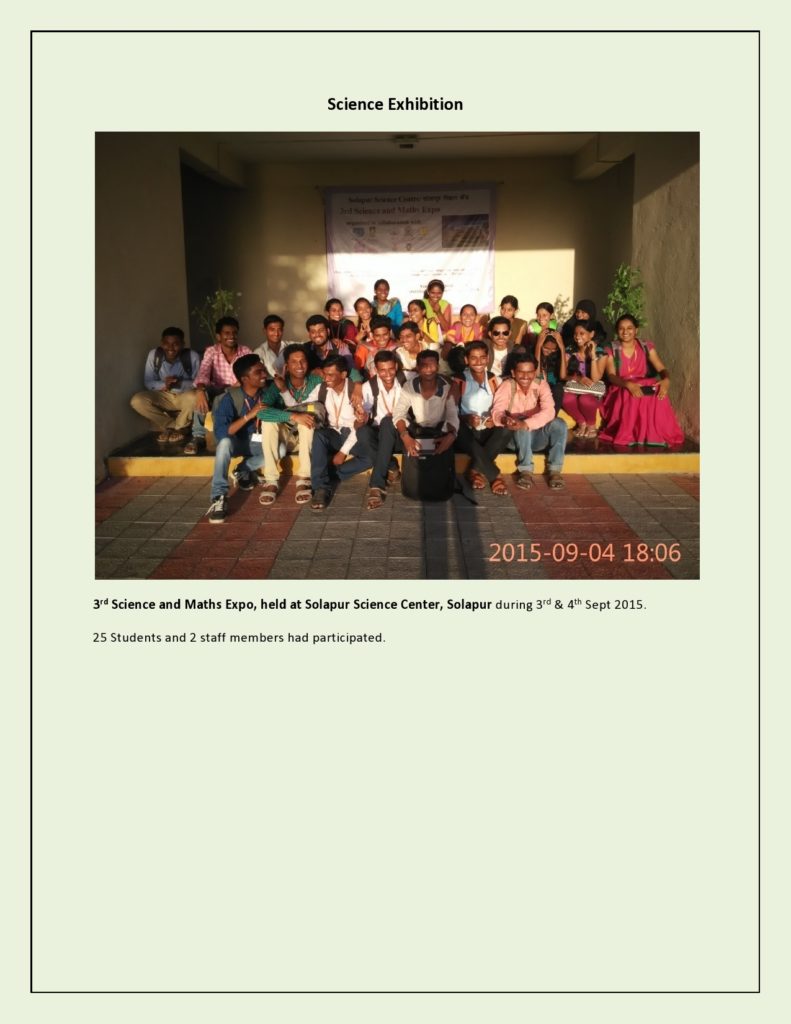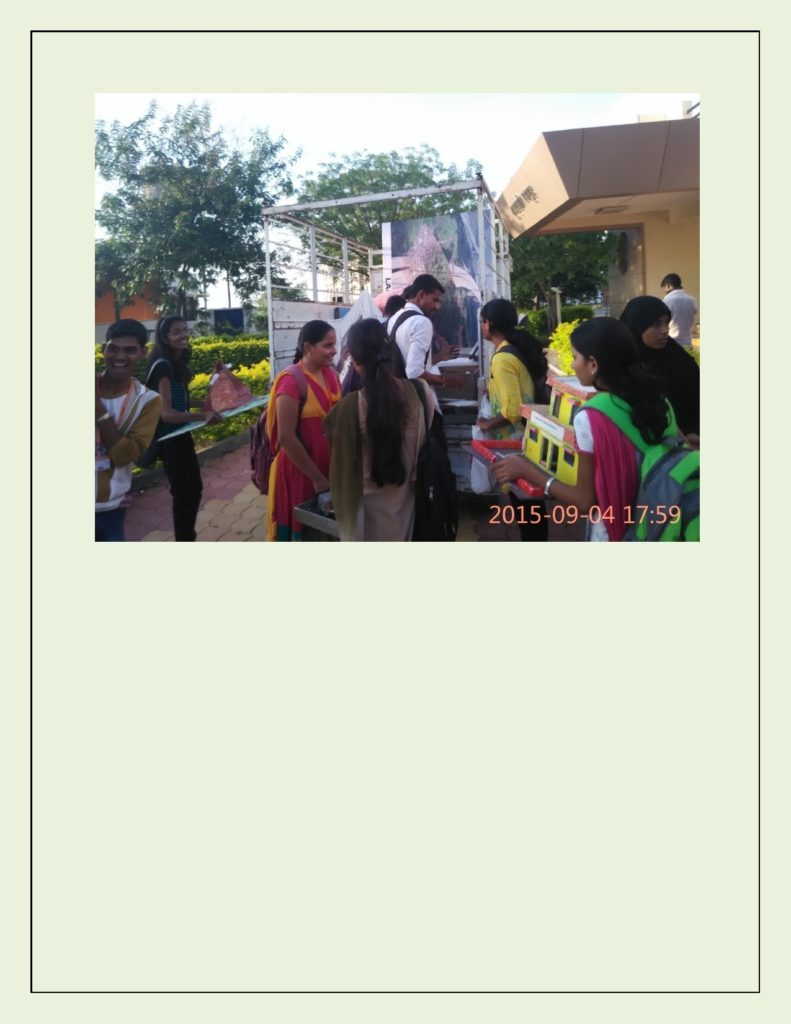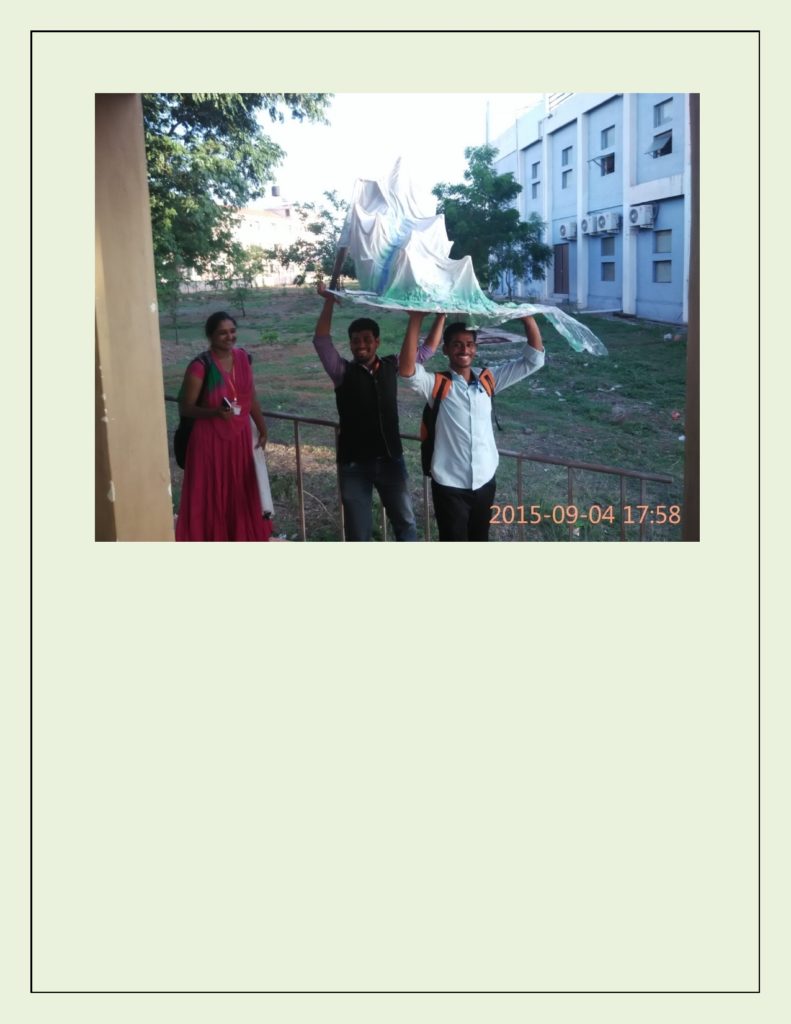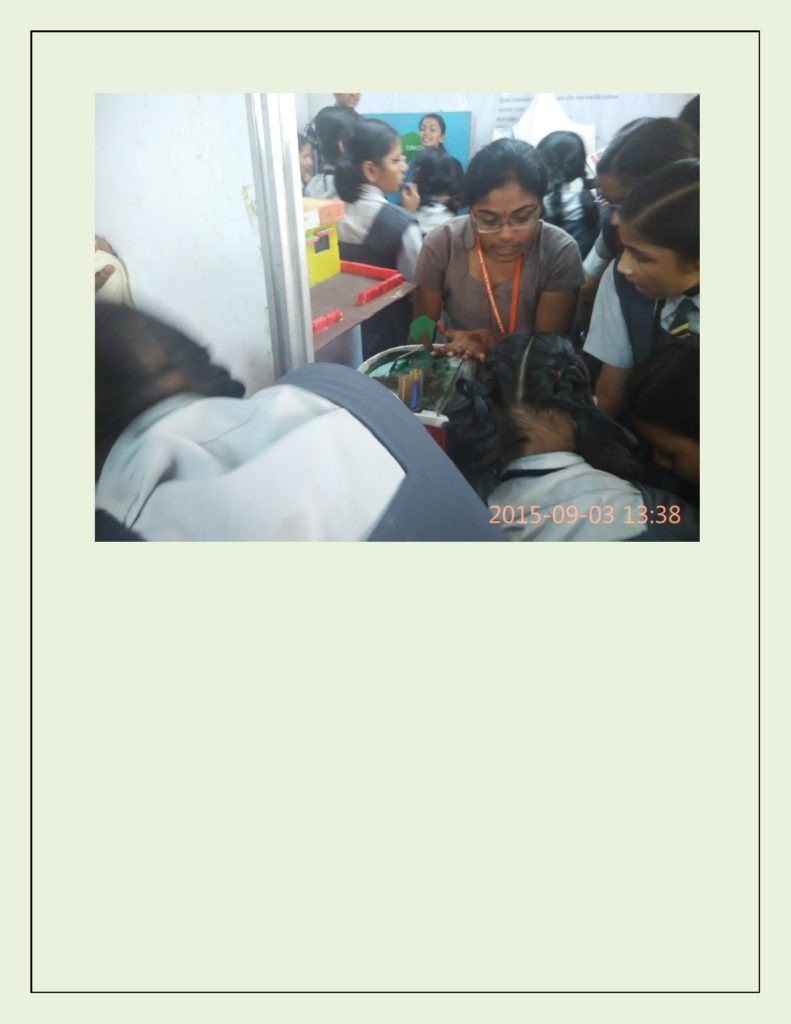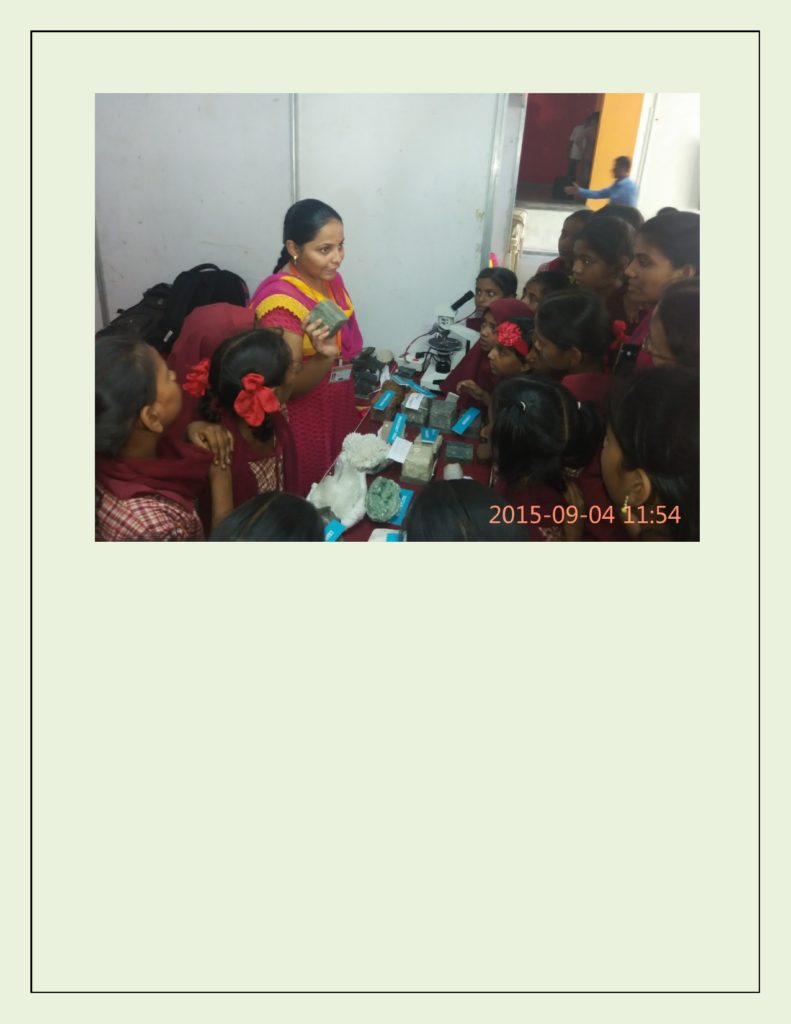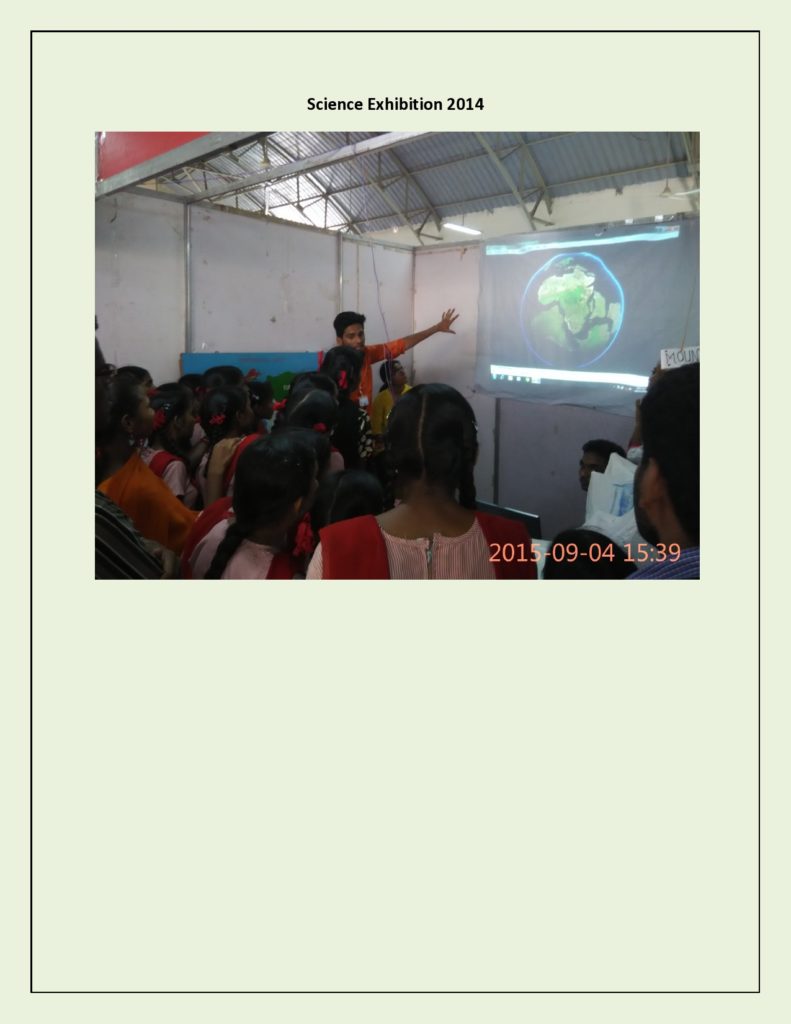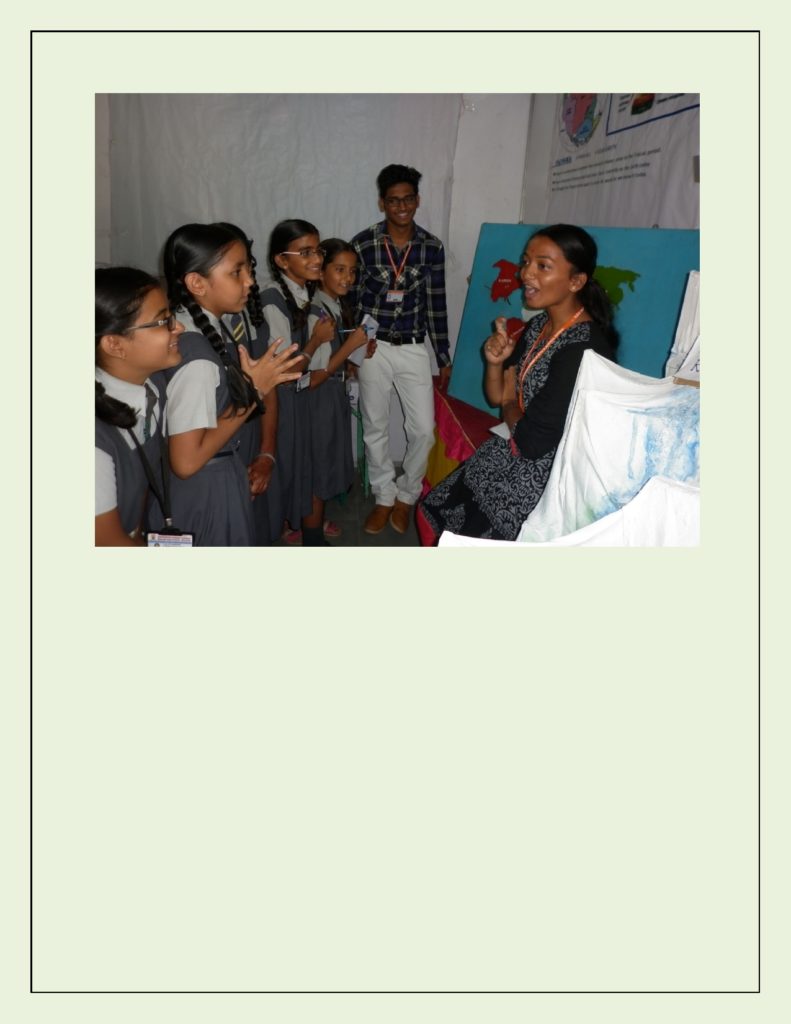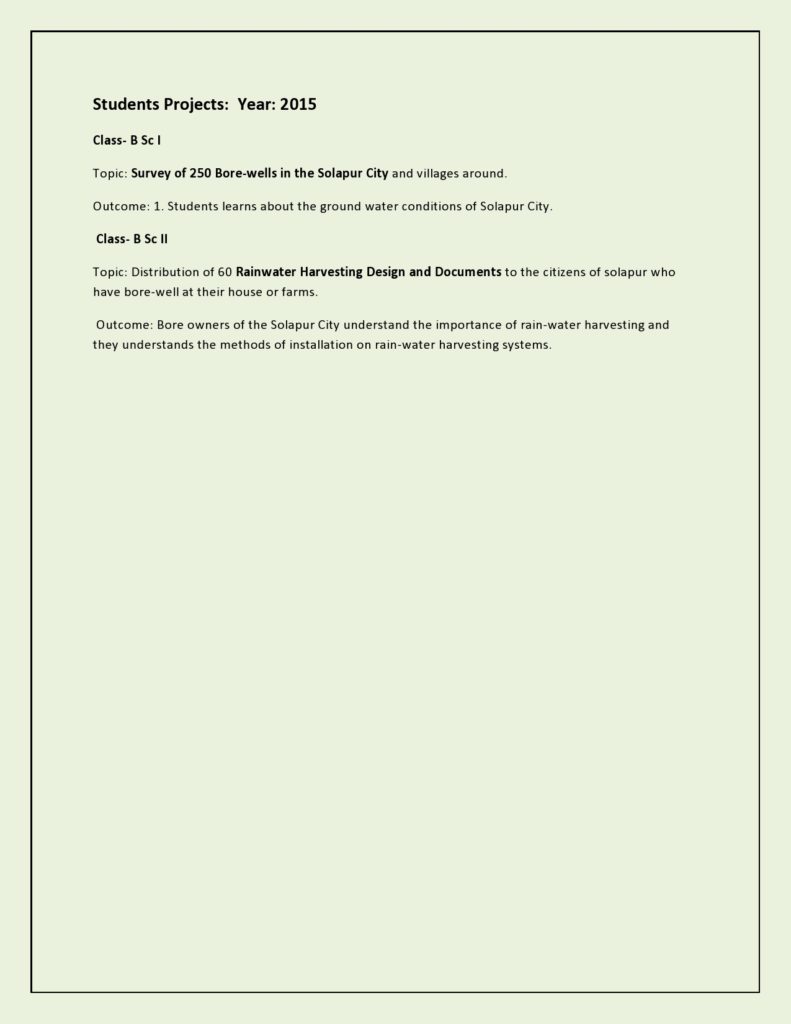Department of Geology
Welcome to Department of Geology
Geology is the science that studies the earth. These studies includes earth’s formation and composition, the processes that create resources such as fuels, minerals, and construction materials, the energy systems that modify landforms on the crust, the historical evolution of life and global climates, and the continuing interaction between humans and the natural environment. Through lecture, lab, and field study, the geology program provides insight, perspective, and application required to assist citizens in making well informed decisions concerning earth-related issues such as water resources, building and engineering, natural disasters, agriculture and ocean resources, and the long-term effects on our planet from an increasing population.
The Department of Geology was established in 1952; T.Y. B.Sc. started from 1964 with the objective of inducing the interest of subject in the young minds of students of under graduate level. The department is one of the oldest Geology departments in India run by well qualified and experienced teaching faculty and other supporting staff.
This department offers students the updated knowledge in Geology along with very basic aspects of the subject as a part of integrated natural system. The subject being fundamental to all sciences, it generates the natural curiosity in the minds of students for its inter-disciplinary nature. Students are encouraged for experiments, practical in laboratory. Major aspects of Geology are learnt outside the classroom in the open fields through short & long duration Geological Excursions every year.
Programme & Course offered: Three years B Sc, CBCS syllabus based honors degree programme contains four courses for first year & second year, however, third year will have eight courses. Each course will have theory based practical. Exams are semester based and there will be practical exams in yearend semesters.
Geological Field Excursion: Field excursions of various durations are arranged every year for B Sc I, II & III class Geology students as part of their syllabus.
Certificate Course in Geoinformatics of six months duration is offered for XII pass-out science students. Geoinformatics Laboratory is well equipped with 15 computers & Licensed ArcGIS, Surfer, Idrisi & MatLab Software & other necessary hardware.
Department has well equipped three specious laboratories. Departmental library offers more than 300 books. Digital book library holds more than 120 books, many research journals, research papers, technical reports, manuals dictionaries, encyclopedias & other digital document references. Audio-visual teaching and learning resources are ample enough to supplement the classroom teaching learning.
Remedial teaching is offered for the students who could not score better in the examinations, however, extra guidance and counseling is offered to all students for better academic & non-academic performances.
Career guidance: Career guidance is regularly done for the students aspiring for higher education. Students are encouraged and trained to get admissions in the reputed educational institutes. Guidance is given for NET, SET, GATE, JAM, UPSC, MPSC and other competitive examinations related to Geology. Many students have benefited through these activities.
Entrepreneurship development program: It is run by the department in collaboration with Vasundhara Geo-consultancies; a professional consultancy team of experts, for the alumni of department after completion of their higher education. In field, hands-on training program is conduced. Trainee students learn most of the professional skills for starting their own consultancy services.
Training includes technical skill development like- Geological field surveying, Expertise services in the fields of Ground water explorations, Electric Resistivity Test (ERT) Services for Engineering Foundation analysis, Watershed Development, Rainwater Harvesting. Water Recharge Zone Identification for rain water harvesting & various Feasibility Tests related to geology. Over-burden and resource estimation of ores & raw building material, Scientific/Geological Report Writing. Technical Report Writing etc.
Additional Training in aspects necessary for running consultancy services.- Basic Soft skills like written & verbal communication are taught to the trainees. Other skills taught are professional communication, preparing quotation, business negotiation, preparing work schedule, executing work schedule, human resource management.
Day Celebrations: Various day celebrations are arranged for the students to nurture additional qualities in their personality. Days like- World Geology Day, World Water Day, World Soil Day, World Environmental Day are celebrated with active participation of the students.
Extension Activities: Teachers of this department take part in many awareness programs related to environmental issues, water, soil, watershed development, rainwater harvesting etc. Students also take part in awareness creating activities. This department helps in building of Geology Laboratories & museums of other educational institutes. Free donations are offered in the form of specimens to other educational institutes.
Geology Museum: The museum has more than 500 specimens at display. Most of the specimens are collected by students and teachers during the past Geological Field Excursions. Some of the specimens are of rare qualities.
FACULTY
R. L. Jagzap
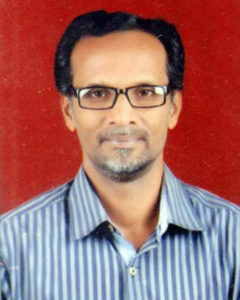
Designation : Head and Associate Professor
Experience : 27 Years
E-mail : rljagzap@dayanand.net
Mobile : 9730394150
Dr. V. M. Dikshit
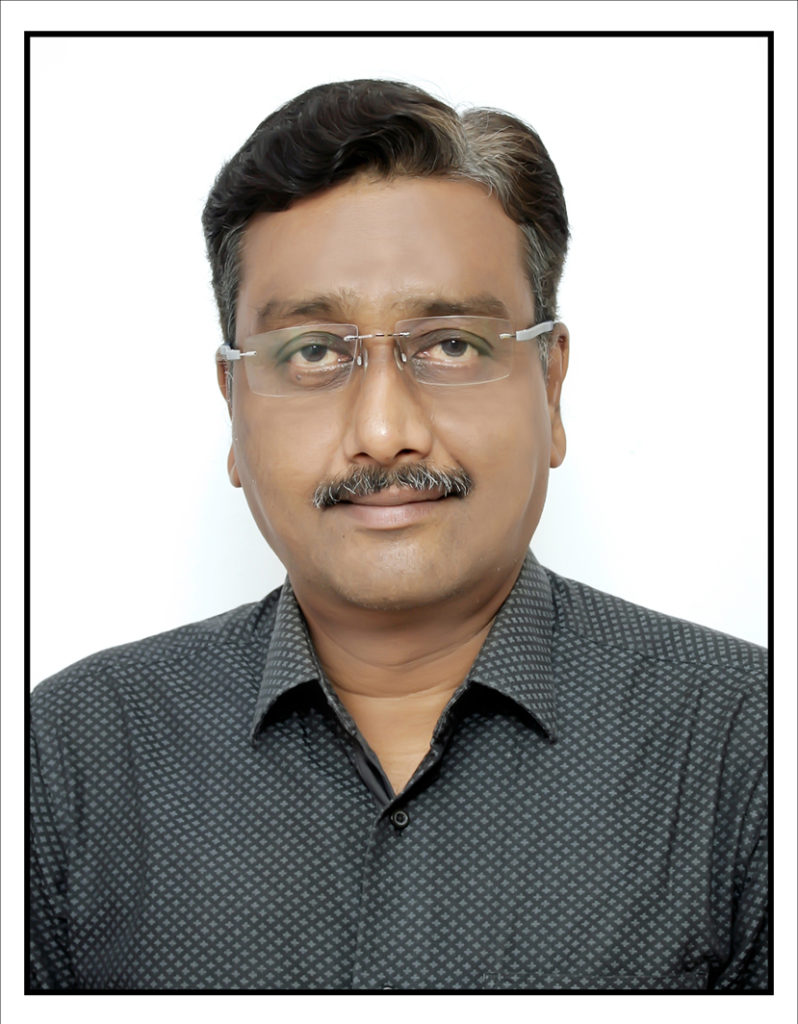
Designation : Associate Professor
Experience : 27 Years
E-mail : vmdikshit@dayanand.net
Mobile : 9421061010
Syllabus
| Class | Syllabus |
|---|---|
| B.Sc. Part-I | View Syllabus |
| B.Sc. Part-II | View Syllabus |
| B.Sc. Part-III | View Syllabus |
| B.Sc. Part-II | View Syllabus |
Program Outcome [B.Sc. I – Microbiology]
- Historical development of microbiology
- Scope of microbiology
- Beneficial and harmful effects of microorganisms
- Diversity in types of microorganisms
- General characters of different microorganism
- Principles of microscopy and use of it to observe and study microbes
- Different staining techniques, Sterilization Techniques, Cultivation techniques of microorganisms, Methods of Pure culture, Maintenance and preservation of pure cultures
- Basic Biochemistry, Microbial Metabolism, Microbial Nutrition and Growth
- Applied branches of microbiology such as water microbiology, sewage microbiology, milk microbiology, medical microbiology
Program Outcome [B.Sc. II – Microbiology]
- Ultra structure and Functions different organelle of bacterial cell
- Bacterial Growth, Effect of Environmental factors on Bacterial growth, Metabolism
- Virology
- Structure of nucleic acids & Replication of Bacterial DNA
- Gene, Genetic code and Transcription, Plasmids
- Bacterial Mutation
- Immunity
- Antigen and Antibody
- Clinical Microbiology
- Pathogenecity, Microbial Diseases
- scope of Industrial microbiology, Fermentation Media, Screening, Inoculum Development and Scale Up, Microbiological assays, Specific fermentations
Program Outcome [B.Sc. III – Microbiology]
- Classification of Viruses, Reproduction of bacterial and animal viruses, Plant Viruses, Techniques in Virology
- Soil microorganisms, types and their role in elemental cycle
- Composting and Biodegradation, Plant diseases Applications of Biotechnology in Agriculture
- Adaptive Immunity, Monoclonal antibodies, Major Histocompatibility complex, Complement system, Immunological disorders
- ABO blood group system, Rh blood group system, Blood transfusion reaction and its complications
- Food Microbiology, Dairy Microbiology, Industrial production of Streptomycin,Lysin, rDNA products, Production of alcoholic beverages, Downstream processing and quality control
- Basic concepts of microbial genetics, Effect of mutation in bacteria, Genetic engineering and Protein engineering, Techniques in molecular biology, Bioinformatics
- Enzyme, Enzyme kinetics and regulation, Extraction, purification and assay of enzymes
- Bioenergetics, Biosynthesis of Nucleotides , Protein ,Peptidoglycan
- Air microbiology, Marine microbiology and Fresh water ecosystem, Extremophiles, Geomicrobiology,
- Environmental impact assessment and Industrial Waste Management
- Clinical Bacteriology, Mycology, Parasitology, Virology , Chemotherapy
Laboratory Skills: Microbiology students would master the following laboratory skills
- work with standard lab safety protocols and procedures.
- work effectively in a team environment.
- document and maintain a record of all lab activities.
- Document and report on experimental protocols, results and conclusions
- review procedures and put them into your own words.
- maintain an aseptic environment.
- understand and use a bright field microscope.
- preparation of and viewing samples for microscopy,
- use appropriate methods to identify microorganisms,
- estimate the number of microorganisms in a sample,
- use common lab equipment.
- Develop competency in the simple,Gram staining and special staining procedure
- prepare culture media, isolate and culture bacteria and fungi
- understand the environmental effects on bacterial growth.
- Develop competence in bacterial and fungal identification.
- Conduct the basic research with the microorganisms and perform the diagnostic procedures required in food, milk ,industrial and pharmaceutical industries
.
Program Outcome [M.Sc. Microbiology]
- Instill the intellectual skills to analyze the molecules using advance biophysical techniques such as HPLC, GC, AAS, PCR etc.
- Perform the quantitative/ qualitative analysis of Biomolecules and understand various biochemical pathways
- Acquire knowledge and understanding the concepts of Microbial genetics, Molecular biology, Immunology, Enzymology.
- Explore the scientific literature effectively and use computational tools such as bio-statistical and bioinformatics
- Role of micro organisms in eco system and impact created by microbes in agricultural development.
- Implement the knowledge in industry with regard to scale up, production, scale down and quality control of the various microbial products
- Conduct the basic research related to industry-environmental issues and use of agricultural for sustainable products
- Students will communicate scientific concepts, experimental results and Analytical arguments clearly and concisely, both verbally and in writing.
- Relationship between human disease and micro organisms, pathogenicity, laboratory diagnosis and treatment method.
- basic knowledge about the micro organisms, Microbial Physiology
Course Outcome [B.Sc. Botany]
| Paper Number | Course Outcome |
|---|---|
| Microbiology Paper – I | View Course Outcome |
| Microbiology Paper – II | View Course Outcome |
| Microbiology Paper – III | View Course Outcome |
| Microbiology Paper – IV | View Course Outcome |
| Microbiology Paper – V | View Course Outcome |
| Microbiology Paper – VI | View Course Outcome |
| Microbiology Paper – VII | View Course Outcome |
| Microbiology Paper – VIII | View Course Outcome |
| Microbiology Paper – IX | View Course Outcome |
| Microbiology Paper – X | View Course Outcome |
| Microbiology Paper – XI | View Course Outcome |
| Microbiology Paper – XII | View Course Outcome |
| Microbiology Paper – XIII | View Course Outcome |
| Microbiology Paper – XIV | View Course Outcome |
| Microbiology Paper – XV | View Course Outcome |
| Microbiology Paper – XVI | View Course Outcome |
LABORATORY
Geology Department provides well equipped, spacious & properly ventilated three laboratories for the students to carry out the entire theory syllabus based practical experiments. Apart from regular practical work, we provide infrastructural, instrumental help for students who wish to carry out extra experiments & observations. Teaching & Supporting staff are well trained to carry out the work smoothly. Two of these laboratories are equipped with audio-visual equipments.
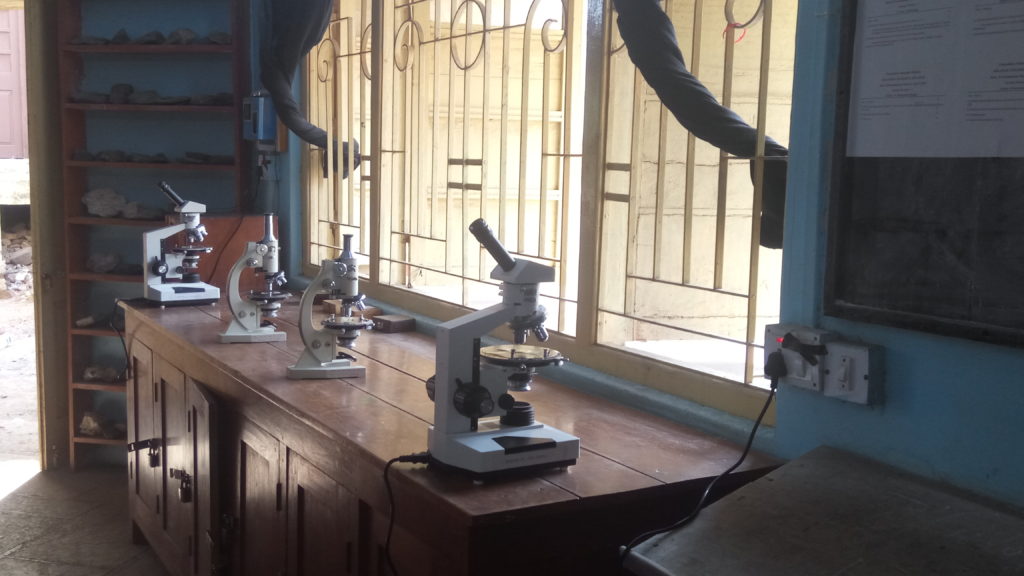
Geology Museum:: Being very old department, we hold huge collection of minerals, rocks, fossils, soil samples collected in field excursions and other geologically relevant things collected in due course of development of our department. Few specimens are very rare and unique. The best specimens are displayed in our Geology Museum which is place of curiosity for beginners and learners.
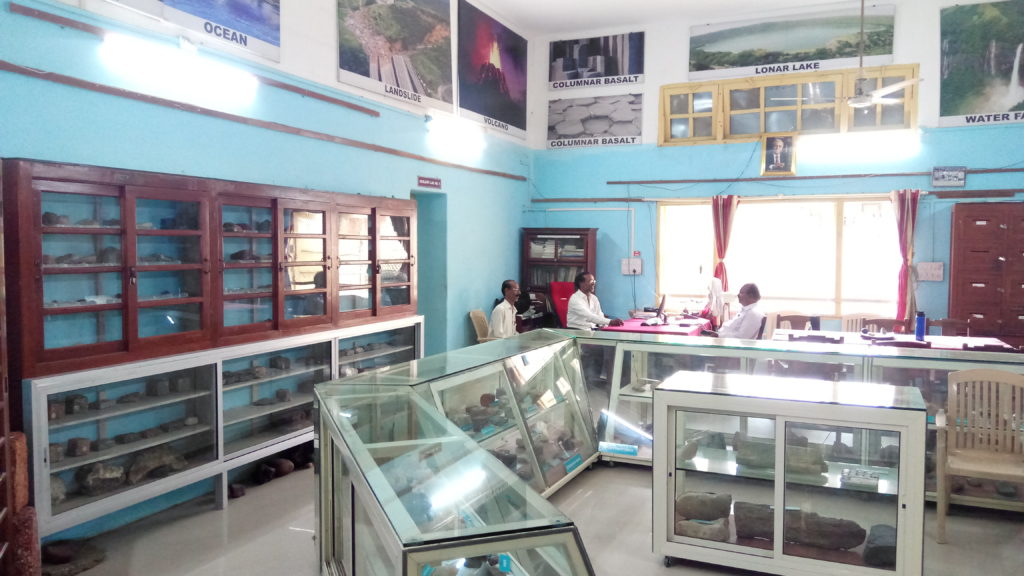
Geo-informatics Laboratory:: We have Geo-informatics Laboratory well equipped with 15 high end desktop computers and peripherals. Software available for GIS studies: IDRISI Taiga, QGIS, ILWIS and GRASS (open source).
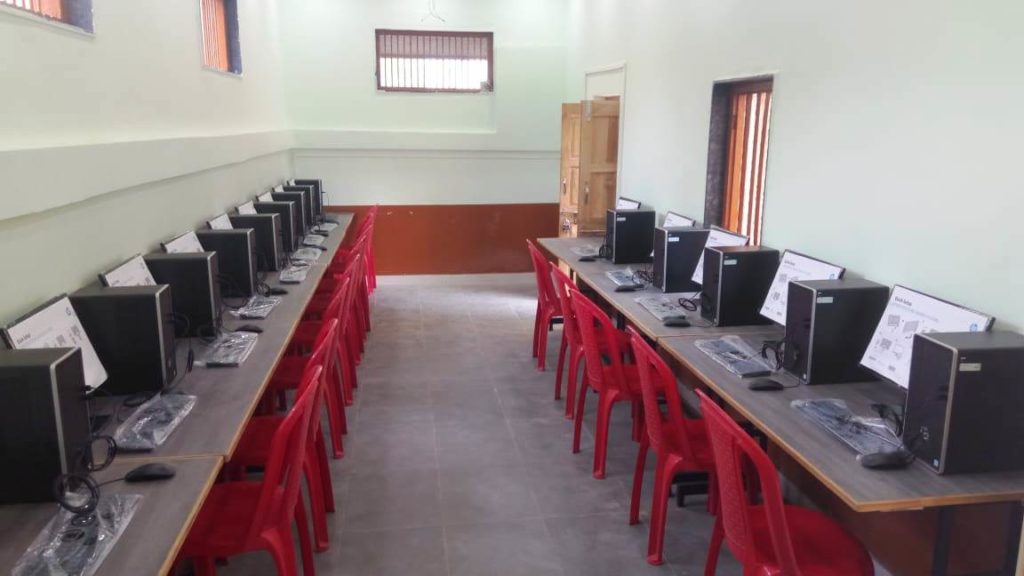
Rock Garden: Keeping in mind that Geology is the subject that can be well learnt in the field, with objective to provide large size expression of rock specimens/examples as the part of syllabus of all B Sc I, II & III Geology course for B Sc programme students, the rock garden is developed.
Apart from the small specimens that students uses at the time of practical, students and visitors to this rock garden can see the replica of true nature and partial expression of large dimensions of rocks through the display of rocks here.
Students understand concept of out-crop, learns & understands Dip-Strike concept.
This also displays field replica of Columnar-Joint structures developed in Basalt, display soil types, replica of symmetrical hill, asymmetrical hill, spur & slope types as part of Geomorphology.
Frequent observation by students of specimens and features displayed in the garden; it helps students to remember the topic learnt very well. Apart from this, the garden generates curiosity about the rock science and geological sciences in the minds of visitors of school students, pre-degree, degree course students & common man.
Research Area
Research areas of the department are Geomorphology, Remote Sensing, GIS and Structural Geology. Faculty members have worked on many research projects funded by UGC, DST and other organizations & published 14 research papers in reputed journals.
Publication of Research Papers
| Sr. No. | Name of Authors | Title of Paper | Name of journal with ISSN/ ISBN No., impact factor, Page no., volume, with year |
|---|---|---|---|
| 1 | Dr. D.G.Kadam | Optimum concentration of supplementary feed for vermicomposting of Tendu leaf (Diospyros melanoxylon Roxb ) refuge using Eudrilus eugeniae (Kinberg).
D.G.Kadam, P.K.Goel and G.R.Pathade |
Pollution Research, 24, 259-262, 2005(ISSN No.: ISSN: 0257-8050Impact Factor: 3.3 ) |
| 2 | Dr. D.G.Kadam | Microbial succession in the casts of Eudrilus eugeniae fed upon tendu (Diospyros melanoxylon Roxb.) leaf residue.
D.G.Kadam, P.K.Goel and G.R.Pathade |
Nature Environment and Pollution Technology , 6, 507- 514. 2007.( ISSN: 0972- 6268, Impact Factor: 3.5 ) |
| 3 | Dr. D.G.Kadam | Effect of precomposting of Tendu (Diospyros melanoxylon RoxB.) leaf residue on the growth and cocoon production of the earthworm Eudrilus eugeniae Michaelsen during vermicomposting in laboratory microcosms.
D.G.Kadam, P.K.Goel and G.R.Pathade |
The Ecoscan, 2(1), 111- 114, (ISSN No.: 0974-0376, Impact Factor: 4.65 ) |
| 4 | Dr. D.G.Kadam | Role of National Service Scheme, Educational Institutions, Rotary Club and Social Forestry in Biodiversity Conservation
S.N. Despande, V.V Shagalolu, D.G. Kadam, L.B.Dama and K.R.Rao |
Indian Journal of Tropical Biodiversity, 19(1) , 1-5, ( ISSN : 0971-4642, Impact Factor: 2.5 ) |
| 5 | Dr. D.G.Kadam | Studies on determination of susceptibility to Dental caries among school children
S.N.Deshpande and D.G.Kadam |
International Journal of Pharma and Biosciences, 3(2), 809- 817, (ISSN No.: ISSN-0975-6299 Impact Factor: 0.47) |
| 6 | Dr. D.G.Kadam | Phytochemical analysis and Antibacterial activity of Acacia nilotica against Streptococcus mutans.
S.N.Deshpande and D.G.Kadam |
International Journal of Pharmacy and Pharmaceutical Sciences.,5(1),
( ISSN-0975-1491, Impact Factor: 1.1 ) |
| 7 | Dr. D.G.Kadam | Anti-bacterial activity and phytochemical analysis of some medicinal plants against Xanthomonas axonopodis punicae, phytopathovar of bacterial blight of pomegranate.
V.A. Garagade and D.G.Kadam |
Bionano Frontier, 6(1), 164-167 ( ISSN-0974-0678, Impact Factor: 0.22 ) |
| 8 | Dr. D.G.Kadam | Use of Internet in Life Science Research amongst Teachers and Students: A Survey
Deshpande.S.N , Shagalolu.V.V , Rao.K.R and Kadam D G |
Indian Streams Research Journal, 2,(12) , 1-8( ISSN: 2230-7850, Impact Factor: 0.2105 ) |
| 9 | Dr. D.G.Kadam | Some Studies on Bacteriological Profile of Kidney Stone
S.D. Deokar & D.G.Kadam |
Golden Research Thoughts, 3, 41-44, ( ISSN: 2231- 5063 Impact Factor: 1.2018 ) |
| 10 | Dr. D.G.Kadam | Pectinase production by Aspergillus species in submerged fermentation by using agricultural wastes as a substrate
V. A. Gargade , R. R. Swami , D. G. Kadam , K. P. Shinde |
Indian Streams Research Journal, 3,(7) 1-5, ( ISSN: 2230-7850 Impact Factor: 0.2105 ) |
| 11 | Dr. D.G.Kadam | GCMS Analysis and antibacterial activity of Piper betle (Linn) leaves against Streptococcus mutans
Deshpande S.N. & Kadam D.G. |
Asian Journal of Pharmaceutical and Clinical Research, 6(5), 99 -101
( ISSN- 0974-2441Impact Factor: 0.7 ) |
| 12 | Dr. D.G.Kadam | Growth and reproduction of Eudrilus eugeniae and Eisenia fetida in Tendu (Diospyros melanoxylon RoxB) leaf as influenced by supplementary feed
Kadam D.G. |
DAV International journal of Science, Vol.(2), (2),50-54,
( ISSN: 2277-5536 Impact Factor: ) |
| 13 | Dr. D.G.Kadam | Preliminary Phytochemical Analysis of some Medicinal Plants
Deshpande S.N. & Kadam D.G. |
DAV International journal of Science, Vol.(2), (2),61-65, ISSN: 2277-5536 |
| 14 | Dr. D.G.Kadam | Effect of tendu(Diospyros melanoxylon RoxB.) leaf vermicompost on growth and yield of French bean (Phaseolus vulgaris L.)
Dilip Kadam & Girish Pahade |
International journal of Recycling of Organic Waste in Agriculture,3: 44, 1-7
( ISSN : 2251-7715 Impact factor 0.48 ) |
| 15 | Dr. D.G.Kadam | Antibacterial activity of some herbal extracts and traditional biocontrol agents against Xanthomonas axonopodis punicae
V.A. Garagade and D.G. Kadam |
Journal of International academic research for Multidisciplinary, 2 : 3: 16-25
( ISSN:2320-5083 Impact factor : 1.393) |
| 16 | Dr. D.G.Kadam | Screening of thermostable lipase producers from alkaline lake
Lokre S.S. & Kadam D.G. |
International Journal of Current Microbiology and Applied Sciences,
3 (11), 240-245( ISSN-2319-7706 Impact Factor: 2.015 ) |
| 17 | Dr. D.G.Kadam | Production and characterization of thermostable lipase from Aeribacillus sp. SSL096201
Lokre S.S. & Kadam D.G. |
GERF Bulletin of Biosciences , 5(2), 1-7 ( ISSN: 2229-6433, Impact factor: 0.9125) |
| 18 | Dr. D.G.Kadam | In vitro evaluation of antibacterial potential of Pongamia pinnata L. against Xanthomonas axonopodis punicae, phytopathovar of Bacterial blight of Pomegranate (Punicagranatum)
V.A. Garagade and D.G. Kadam |
International Journal of Current Microbiology and Applied Sciences .4(5) , 824-833 (ISSN-2319-7706, Impact Factor: 2.015 ) |
| 19 | Dr. D.G.Kadam | Screening of antibacterial activity of Ricinus communisL. leaves extracts against Xanthomonas axonopodis pv. punicae
V.A. Garagade and D.G. Kadam |
International Journal of Advanced Research in Biological Sciences, 2(9): 47–51(ISSN: 2348-8069, Impact factor: ICV: 5.01, SJIF: 4.620 ) |
| 20 | Dr. D.G.Kadam | Isolation and characterization of proteus spp. from domestic disposal expressing extrachromosoal extended spectrum β-lactamase trait
Archana A. Kharat, Sopan Bawale, Dilip G. Kadam, Arun S. Kharat |
International Journal of Genetics, 7, (1),170-176.( ISSN: 0975-2862 & E-ISSN: 0975-9158, Impact factor: Index Copernicus value: 4.61, NAAS: 4.0 ) |
| 21 | Dr. D.G.Kadam | Evaluation of antibacterial activity of extracts of piper betle [linn.]leaves against streptococcus mutans
Deshpande S.N. & Kadam D.G. |
World journal of pharmacy and pharmaceutical science, 4,( 11), 1040-1050 (ISSN 2278 – 4357, Impact factor: SJIF Impact Factor 5.210 ) |
| 22 | Dr. D.G.Kadam | Growth and Reproduction of Eudrilus eugeniae in Tendu (Diospyros melanoxylon Roxb.) Leaf Residues as Influenced by Feed Particle Size
D.G.Kadam |
Int.J.Curr.Microbiol.App.Sci (2015) 4(11): 206-210 (ISSN: 2319-7706 Impact factor: 2.015 ) |
| 23 | Dr. D.G.Kadam | In-vitro evaluation of antioxidant activity of aqueous and solvents extracts of gymnema Sylvester
Dilip G. Kadam, Nitin D. Deshmukh, Rahul R. Shelke
|
World journal of pharmacy and pharmaceutical sciences
Volume 5, Issue 5, 1152-116 (ISSN 2278 – 4357. SJIF Impact Factor 6.041 ) |
| 24 | Dr. D.G.Kadam | Studies on selected bacteria and glycolytic enzyme activities in the gut of Eudrilus eugeniae
Kadam D.G.& G.R.Pathade |
Int.J.Curr.Microbiol.App.Science, (2017) 6 (4) : 2256-2264 ( ISSN: 2319-7706 Impact factor: 5.38 ) |
| 25 | Dr. D.G.Kadam | Co-existence of multiple β-lactamase traits among clinical isolates of Escherichia coli from rural part of Maharashtra, India
Kharat A.A., Kharat Arun and Kadam D.G. |
African Journal of Microbiology Research. 11(7) 278-286 (ISSN: 1996-0808, Impact factor: 5.0 ) |
| 26 | Dr. D.G.Kadam | Isolation and Characterization of Multiple Antibiotic Resistant Aeromonas spp. from Urinary stone of Urolithiasis Patients
Deokar S.D. & Kadam D.G. |
Int.J.Pharm. Sci. Rev.Res, July-August. 45 (2) : 104- 109 (ISSN: 0976- 044X, Impact factor: 5.38 ) |
| 27 | Dr. D.G.Kadam | Production of bio-ethanol by anaerobic fermentation of green tobacco leaves (Nicotina tobaccum) by using Saccharomyces cerevisiae
V.A.Garagade, D.G.Kadam |
International Journal of development Research
7(6), 13007- 13010, (ISSN: 2230- 9926, Impact factor: 5.0) |
| 28 | Dr. D.G.Kadam | Bioethanol Production: Optimization of parameters for ethanol production by using Saccharomyces cerevisiae
Rohini Shivasharan & D.G.Kadam |
DAV International journal of Science, 7 (1) (ISSN: 2277-5536(Print); 2277-5641(online)
|
| 29 | Dr. D.G.Kadam | Isolation , characterization of Potassium solubilizing Bacteria and its effect on the growth of Trigonella foenum- graecum
Meru J.A., Garagade V.A., Pawar R.S., Sura A.S, Gund S.S., Bhandari Y.L. and Kadam D.G.
|
Contemporary Research in India, Special Issue : National Seminar:Recent Trends in Plant Sciences and Agricultural Research, 302, ( ISSN: 2231- 2137, NAAS Score:2.23 ) |
| 1 | Mrs.N.R.Damle | Enzymatic potential of Bacteria isolated from the rhizosphere of Aegle marmelos (Bael tree) Damle N.R. and S.W. Kulkarni. | World Journal of Environmental Biosciences. Vol. 1 Issue 2 E ISSN 2277-8047
|
| 2 | Mrs.N.R.Damle | Enzymatic potential of Bacteria isolated from the rhizosphere of Pongamia glabra (Karanj) Damle N.R. | Journal of Microbial World, 14(1) ISSN-0972-1487: 69-73
|
| 3 | Mrs.N.R.Damle | Screening of rhizomicroflora from the rhizosphere of Calotropis procera for their multiple plant growth promoting and antimicrobial activities, Damle N.R. and S.W. Kulkarni. | Indian Streams Research Journal, Vol.3 issue 10 Nov 2013: 1-4
Impact factor: 1.7604(UIF)
|
| 4 | Mrs.N.R.Damle | In vitro Screening of rhizomicroflora from the rhizosphere of Withania somnifera for multiple plant growth promoting activities. Damle N.R. and S.W. Kulkarni. | “Avishkar” Solapur University Research Journal,Vol.3, 2014: 52-60 |
| 5 | Mrs.N.R.Damle | Screening of rhizomicroflora from the rhizosphere of Pongamia glabra for their multiple plant growth promoting and antimicrobial activities, Damle N.R. and S. W. Kulkarni (2018). | Journal of Environmental Research and Development; vol.9 No. 02 Oct-Dec 2014, 318-323 E ISSN 2319-5983 ISSN 0973-6921
Impact factor: 1.268
|
| 6 | Mrs.N.R.Damle | Screeningof rhizomicroflora from the rhizosphere of Azadirachta indica for their multiple plant growth promoting and antimicrobialactivities. Damle N.R. and S. W. Kulkarni (2018). | Contemporary research in India. ISSN 2231-2137 Special issue IV: 329-333
NAAS Score 2017:3.23, UGC approved journal No.62441 |
| 7 | Mrs.N.R.Damle | Screening of rhizomicroflora isolated from the rhizosphere of Aegle marmelos for multiple plant growth promoting and antimicrobial activities. Damle N.R. and S. W. Kulkarni. | World Journal of pharmaceutical research. Vol. (7), 824-838. ISSN 2277-7105
SJIF Impact factor: 8.074
|
| 1 | Dr. S.N. Deshpande | Studies on determination of susceptibility to dental caries among school children .
|
International journal of pharma and pharmaceutical sciences
Deshpande SN,Kadam DG Vol.3,issue2, [ISSN0975-6299,April 2012,IF=0.1] |
| 2 | Dr. S.N. Deshpande | Role of national service scheme, educational institutions, rotary club and social forestry in biodiversity conservation
Deshpande SN,Shagalolu VV,Rao KR,Kadam DG,Dama LB |
Indian journal of tropical biodiversity,vol 19,issue 1 |
| 3 | Dr. S.N. Deshpande | Phytochemical analysis and antibacterial activity of stem bark of Acacia nilotica against Streptococcus mutans
Deshpande SN,Kadam DG, |
International journal of pharma and pharmaceutical sciences[IF=1.59] |
| 4 | Dr. S.N. Deshpande | Use of internet in life science research by teachers and students:ASurvey.
Deshpande SN,Kadam DG, |
Indian Stream Research Journal VOL.2,ISSUE-12 ISSN 2230-7850, Jan.
2013,IF=0.21 |
| 5 | Dr. S.N. Deshpande | GCMS Analysis & antibacterial activity of Piper betle leaves against Streptococcus mutans
Deshpande SN,Kadam DG, |
Asian Journal of Pharmacy and Clinical Research,vol.6,
suppl 5, ISSN-0974-2441,Nov..2013,IF=0.7] |
| 6 | Dr. S.N. Deshpande | Preliminary phytochemical analysis of some medicinal plants,
Deshpande SN,Kadam DG, |
DAV International Journal of Science Volume-Volume-2 Issue-2 ISSN: 2277-5536 2013] |
| 7 | Dr. S.N. Deshpande | Evaluation of antibacterial activity of extracts of piper betle [linn.]Leaves against streptococcus mutans ,
Deshpande SN,Kadam DG, |
World journal of pharmacy and pharmaceutical sciences,vol.4,issue11,IF=5.2]
|
| 8 | Dr. S.N. Deshpande | Evaluation of Antibacterial Activity of extract of
housefly, Musca domestica, Shagalolu VV, Deshpande SN, |
Indian journal of applied research,vol.6,issue- 4
[ISSN: 2249-555X,April, 2016,IF=3.9] |
| 9 | Dr. S.N. Deshpande | Antibacterial activity of chemically synthesized Fe2O3nanoparicles
Kore,Deshpande SN,Shahane GS, |
Contemporary Research in India, ISSN NO.2231-2137UGC APPROVED j no.62441,Jan.2018 |
| 1 | Kamble S.H. | Isolation And Characterization of Bacterial Strains From Solid Wastes For The Production of Extracellular Enzymes And Degradation of Environmental wastes
(International) |
Review of Research
Vol.|3|Issue.9|June 2014 Impact Factor: 2.1002(UIF) ISSN:- 2249-894X |
| 2 | Kamble S.H. | Isolation And Characterization of Potential Probiotic Microorganisms From
Indian Traditional Fermented Food Products For The Production of Antimicrobial Substances Against Human Pathogens. (International) |
Science Park Research Journal
ISSN:2321-8045 Impact Factor:1.6200(UIF-2015) Volume-3| Issue 7|27th August |
Research Scholars
| Sr. No | Name of the student | Name of the Guide | Registration No. | Research Topic | Status(ongoing/ Awarded/ Submitted) |
|---|---|---|---|---|---|
| 1 | Mr. Satish Dinkarrao Deokar | Dr. D. G. Kadam | SUS/ BCUD/ PGBUTR/ 2010-11 / 2936 DT. 13/ 7/ 2011 | Studies on antibiotic resistance patterns of bacterial isolates from urinary tract infections in Barshi tehsil, Maharastra | Ongoing |
| 2 | Mrs. Archana Arun Kharat | Dr. D. G. Kadam | SUS/ BCUD/ PGBUTR/ 10879 DT. 15/ 12/ 2012 | Isolation ,antibiotypes and genetic characterization of the extended spectrum beta lactam enteric bacteria from Osmanabad and Solapur District | Ongoing |
| 3 | Ms. Rohini Ravindra Shivsharan | Dr. D. G. Kadam | SUS/ BCUD/ PGBUTR/ 10879 DT. 15/ 12/ 2012 | Studies on bioethanol Production: Improvement of ethanol production by enhancement of biomass, nutrient supplementation and mutagenesis of native Saccharomyces cerevisiae | Ongoing |
| 4 | Mr. Nitin Devidas Deshmukh | Dr. D. G. Kadam | SUS/ BCUDPGBUTR/ 2012-13/ 8474 DT. 24/ 9/ 2012 | Studies on biosurfactant based Nanoparticles for evaluating their efficacy against selected pathogens | Ongoing |
| 5 | Dr. Mrs. S. N. Deshpande | Dr. D. G. Kadam | SUS/ BCUD/ PGBUTR/ 2010-11/ 5191.
DT. 5/ 10/ 2010 |
Evaluation of selected herbal extracts for management of dental caries | Awarded |
| 6 | Mrs. Vaishali Arun Garagade | Dr. D. G. Kadam | SUS/ BCUD/ PGBUTR/ 2010-11/ 5191.
DT. 5/ 10/ 2010 |
Efficacy of some medicinal plant extracts for management of Bacterial blight of pomegranate (Punica granatum L. ) | Awarded |
| 7 | Mr. Shekhar. Shamrao. Lokare | Dr. D. G. Kadam | SUS/ BCUD/ PGBUTR/ 2010-11/ 95191.
DT. 5/ 10/ 2010 |
Studies on thermotable Lipases of alkaliphilic bacteria isolated from an alkaline lake | Awarded |
Research Facilities
The department provides adequate instrumental facilities for undertaking research by UG and PG students and faculty members. It has research facility like FTIR, U.V. Spectrophotometer, Cooling centrifuge, High Speed Centrifuge, Shaker Incubator, Laminar Air Flow Facilities, Electrophoresis Units, Micropipettes, Binocular research Microscopes and Laboratory fermenter etc.
Departmental facilities are the provided to the researchers from the other institutions in Solapur as well as nearby places and industries.
Research Projects by the faculty
| Sr. No. | Title of Project | Principal Investigator | Funding Agency | Duration | Amount Sanctioned and Status |
|---|---|---|---|---|---|
| 1 | Studies on Microbiological and biochemical aspects of vermicompost and vermiwash obtained from Vermicomposting of Agricultural waste by Eudrilus eugeniae | Dr. D. G. Kadam | U.G.C
File no- 47-064/ 06 (WRO) |
2006- 2008 | 65000
and completed |
| 2 | Evaluation of antimicrobial potential of Pseudocalymma alleaceum
|
Mrs. T. T. Bapat
|
U.G.C
File no- 47-1021/ 09 (WRO)
|
2009
|
90000
and Completed |
| 3 | Determination of susceptibility to dental carries by Snyder’s Test and Estimation of lactobacillus count in School going children’s in Solapur City | Mrs. S .N. Deshpande
|
U.G.C
File no- 47-962/ 09 (WRO) |
2009 | 130000
and Completed
|
| 4 | Studies on potential of Rhizobacteria Associated with Medicinal plant roots | Mrs. N.R. Damle
|
U.G.C
File no- 47-1624/ 10 (WRO)
|
2009
|
110000
and Completed |
Students Research Project Allotment List
| Sr. No. | Name of Guide | Name of Student | Title of project | Year |
|---|---|---|---|---|
| 1 | Dr.D.G.Kadam | Miss Birajdar P.V. | Isolation and characterization of Azotobacter spp. from cultivated and non cultivated soils of Solapur district | 2017-18 |
| 2 | Dr.D.G.Kadam | Mr. Vidhate Prasad V. | Extraction of Melanin pigments from hairs | 2018-19 |
| 3 | Mrs. T.T. Bapat | Ms. Nesargi Poonam Rajendra | Ecofriendly IODO AID | 2017-18 |
| 4 | Dr. S.N.Deshpande | Miss Akkalkote Rajashree | Antimicrobial action of Lichen against human pathogens | 2018-19 |
| 5 | Mrs N.R.Damle | Mr. Rathod Shivam | Exploring microflora compost pile | 2017-18 |
| 6 | Mrs N.R. Damle | Ms. Patil Nikita V. | Lucrative applications of Coconut waste | 2018-19 |
| 7 | Mr. Kamble S.H. | Miss Patil Nikita V. | Isolation and Characterization of probiotics from Indian traditional fermented food products and evaluation of antimicrobial activity of probiotics against human pathogens. | 2017-18 |
| 8 | Mr. Kamble S.H. | Miss Shaik Farzana A. | Bacteriophage therapy for prevention and control Klebsiella pneumoniae infections | 2018-19 |
| 9 | Mr. Kamble S.H. | Miss Aditi Malekar | Antimicrobial action of Plant extracts against human pathogens | 2018-19 |
Result Analysis [2013-2018]
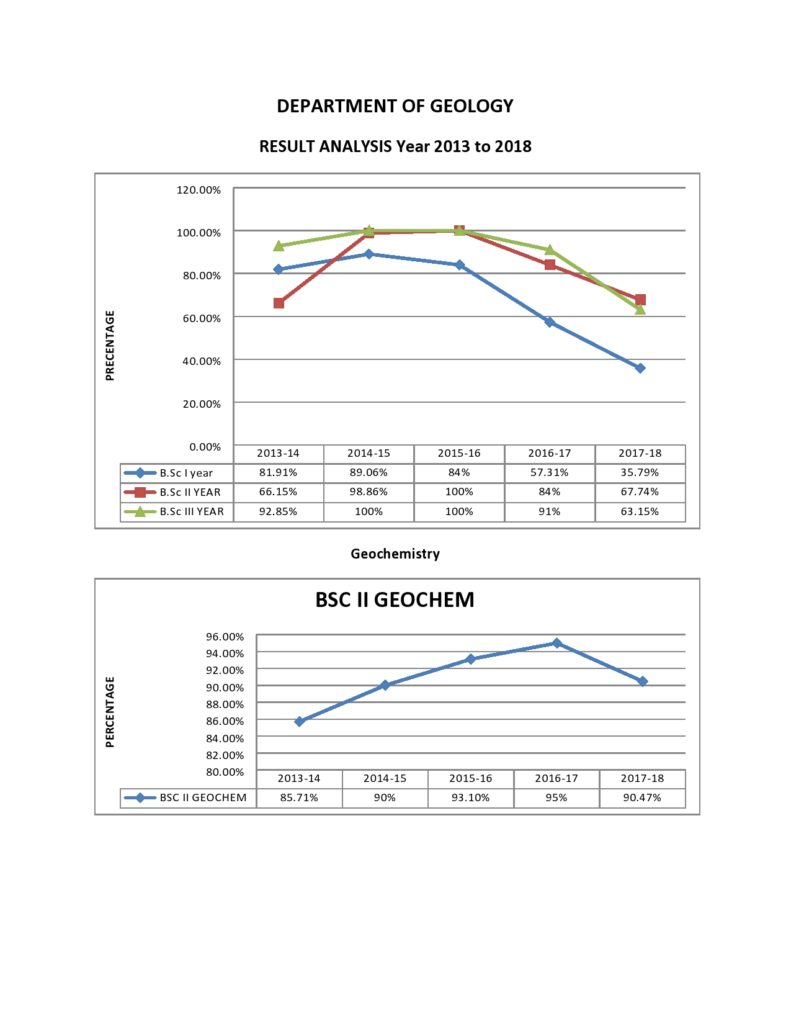
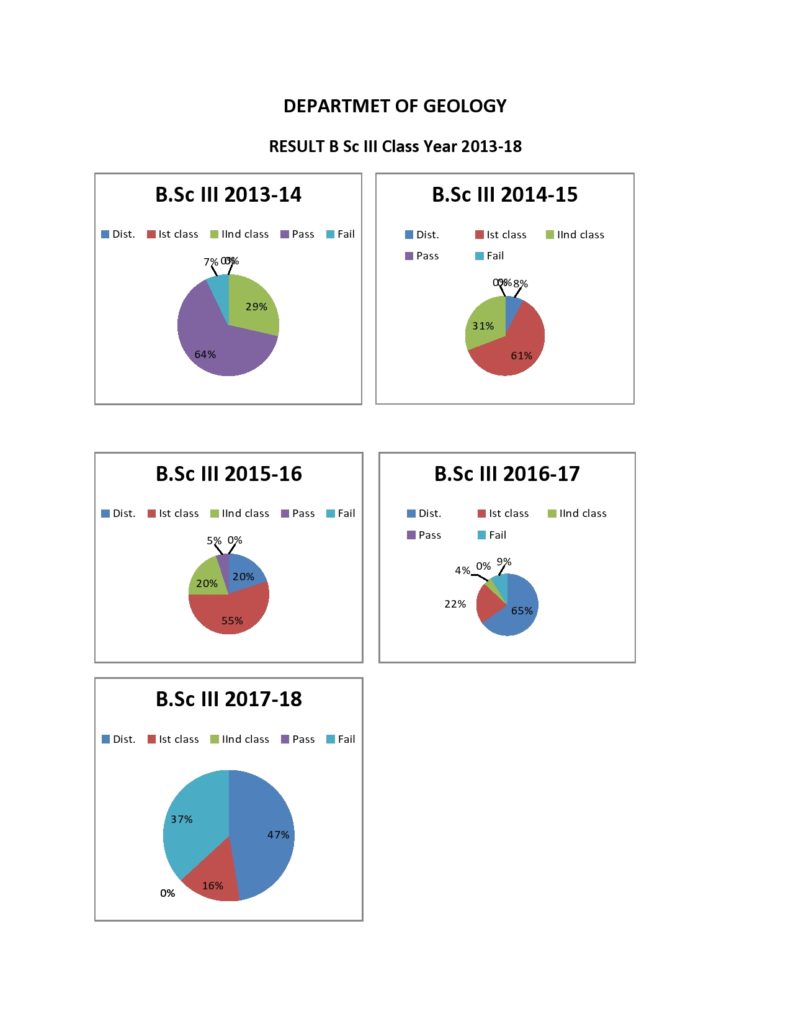
Skill Course
| Sr. No. | Name of the Course | Syallbus |
|---|---|---|
| 1 | Certificate Course in Geo-informatics (CCGI) | View Syllabus |
Activity Reports
| Year | Reports |
|---|---|
| 2013-14 | View Report |
| 2014-15 | View Report |
| 2015-16 | View Report |
| 2016-17 | View Report |
| 2017-18 | View Report |
| 2018-19 | View Report |
